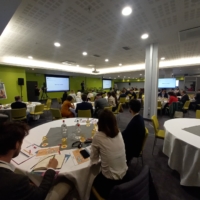Conference on cross-border data availability
GIS + Knowledge sharing | 21 June 2024
In 2018, national and regional representatives of Germany and its neighbouring countries responsible for territorial surveillance signed a memorandum of committing to work together to improve the availability of cross-border data.
The aim is to improve the monitoring of cross-border areas, facilitate access to data and the development of specific cross-border statistics. Members of the network meet regularly to exchange views on their activities, actively work on the definition and harmonisation of cross-border data and indicators and to contribute to the dissemination of their results at national and European level. Since 2018, the network has been helping to ensure that the needs of border regions are better taken into account in the European Statistical System.
CESCI is so far the first and only member from a country not bordering Germany to join the European Cross-Border Monitoring Network. The network has recently scaled up and is currently waiting for actors from all over Europe working on cross-border issues to join.
Through the work of the network, we have learned about the SCORUS (Standing Committee on Regional and Urban Statistics) conference on “Regional and Local Statistics for Better Informed Policy Making”, which was held in Brussels on 5 and 6 June 2024. The conference was co-organised by DG Regio and Eurostat, in a hybrid format, with the audience and some of the speakers joining online. Our organisation was represented by Viktória Jánosi, GIS expert. The participants were representatives of national, European and international institutions (universities, national statistical offices, JRC, OECD, etc.).
During the two-day event, a number of interesting presentations were given. We listened with particular interest to the speeches in the cross-border statistics session. In this session, Claire Duvernet gave an introductory presentation of the European Cross-Border Monitoring Network, promoting it and raising awareness on the need for better cross-border statistics and possible improvements. We all experienced the difficulties mentioned at the end of the presentations regarding analysing and collecting cross-border data.
In the session on Functional Rural Areas, several different methodologies for the delimitation of FRAs were brought up, which led to an interesting and enlightening discussion at the end of the session. A large number of the presentations on the second day were given by national statistical offices, presenting their own work, which in many cases concluded with remarkable results.
It became clear to us that the problems we are struggling with – data processing, data on small territorial units and lack of harmonisation of data between countries – are of concern and interest to many actors in different countries and border regions of Europe. To address these, broad cooperation will be needed, and this emerging professional network could be a good basis for this.

